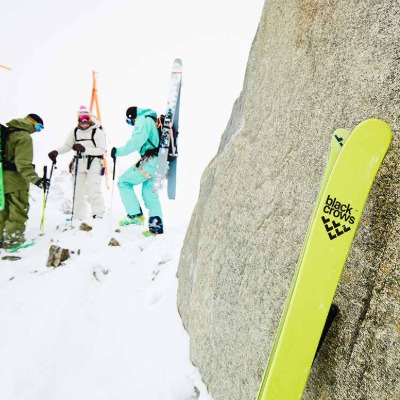Bipartisan Legislation Allows National Forests To Retain Fees Generated By Ski Areas To Support Local Recreation Needs

Colorado U.S. Senator Michael Bennet and U.S. Senator John Barrasso (R-Wyo.) have reintroduced the Ski Hill Resources for Economic Development (SHRED) Act to invest in outdoor recreation in mountain communities by enabling National Forests to retain a portion of the annual fees paid by ski areas operating within their boundaries. Last Congress, the SHRED Act passed the U.S. House of Representatives and advanced out of the U.S. Senate Committee on Energy and Natural Resources.
“Colorado’s outdoor recreation economy depends on the strong partnership between ski areas, the U.S. Forest Service, and our mountain towns,” said Bennet. “The SHRED Act will provide support to our popular Colorado mountain communities and National Forests as their landscapes face increased demand. This bill has strong bipartisan support on the ground and in the House and the Senate. Congress should move to swiftly pass this legislation to support our ski areas and recreation management on our public lands.”
“Communities across Wyoming understand the importance of skiing to our economy,” said Barrasso. “Our bipartisan legislation will keep ski area fees available for local use instead of sending them to Washington. Wyoming communities and ski areas will be able to reap the benefits of this money for critical projects like facility and trailhead improvements. They’ll also be able to limit the impact of wildfires. The SHRED Act is a win for skiers, our local economies, and the health of our forests.”
According to the latest estimates from the U.S. Forest Service, the legislation could bring up to $27 million in retained ski area fees to Colorado National Forests that can be used to improve the ski area program and permitting, as well as overall National Forest recreation management and community needs.
In exchange for using some of America’s most stunning forestlands, the 124 ski areas operating on Forest Service lands across the country pay fees to the Forest Service that average over $40 million annually. The SHRED Act would establish a framework for local National Forests to retain a portion of ski fees to offset increased recreational use and support local ski permit and program administration. The SHRED Act also provides the Forest Service with flexibility to direct resources where they are needed the most.
The SHRED Act would:
-
Keep Ski Fees Local: By establishing a Ski Area Fee Retention Account to retain the fees that ski areas pay to the Forest Service. For National Forests that generate ski fees, 80 percent of those fees are available for authorized uses at the local National Forest. The remaining 20 percent of those fees would be available to assist any National Forests with winter or broad recreation needs.
-
Support Winter Recreation: In each forest, 75 percent of the retained funds are directly available to support the Forest Service Ski Area Program and permitting needs, process proposals for ski area improvement projects, provide information for visitors and prepare for wildfire. Any excess funds can be directed to other National Forests with winter or broad recreation needs.
-
Address Broad Recreation Needs: In each forest, 25 percent of the retained funds are available to support a broad set of year round local recreation management and community needs, including special use permit administration, visitor services, trailhead improvements, facility maintenance, search and rescue activities, avalanche information and education, habitat restoration at recreation sites and affordable workforce housing. This set-aside would dramatically increase some Forest Service unit’s budgets to meet the growing visitation and demand for outdoor recreation.
The SHRED Act is supported by the National Ski Area Association and its 124 member ski areas operating on public lands, Northwest Colorado Council of Governments, Colorado Ski Country USA, Outdoor Recreation Roundtable, Colorado Association of Ski Towns, America Outdoors Association, Vail Resorts, and Jackson Hole Mountain Resort.
In addition to Bennet and Barrasso, the bill is co-sponsored by U.S. Senators Ron Wyden (D-Oregon), Cynthia Lummis (R-Wyo.), John Hickenlooper (D-Colo.), Mike Crapo (R-Idaho), Mark Kelly (D-Ariz.), Steve Daines (R-Mont.), Jeanne Shaheen (D-N.H.), James Risch (R-Idaho), Dianne Feinstein (D-Calif.), Maggie Hassan (D-N.H.), Catherine Cortez Masto (D-Nev.).
The bill text is available HERE. A one-page summary of the bill is available HERE.
“Ski areas across the country appreciate Senator Bennet’s leadership in the Senate and unwavering support for outdoor recreation. Retaining ski area permit fees with the Forest Service will help boost the agency’s recreation capacity, improve visitor services and expand access to our nation’s forests for all Americans,” said Kelly Pawlak, President/CEO, National Ski Areas Association.
“CAST is excited to see the SHRED Act take the next step in the legislative process and is proud to have collaborated with Senator Bennet, federal land managers, the ski industry and local governments to develop the bill,” said Margaret Bowes, Executive Director, Colorado Association of Ski Towns. “The SHRED Act will direct much-needed funding to some of the nation’s most visited national forests and give the USFS additional resources to manage and protect the public lands on which mountain town economies are so dependent.”
“NWCCOG congratulates Senator Bennet and his staff on this groundbreaking bill which will bring millions of dollars back to the White River National Forest and other forests with ski areas to give a leg up to underfunded offices and forest staff who manage permits and recreation in the busiest national forests in the U.S.,” said Jon Stavney, Executive Director, Northwest Colorado Council of Governments. “With the impacts of COVID and Climate this funding comes at a critical time for our beloved forests. The Senator and his staff worked hard to negotiate a bill that would allow our local governments to stop having to backfill recreation management budgets on nearby national forests as they have in recent years. Now more than ever, our forests need active management, and this legislation provides the funding for our National Forest managers to do just that.”
“Our regional economy is driven by outdoor recreation and the SHRED Act will help ensure that the ski area fees generated locally are put back toward building a resilient & sustainable tourism experience,” said Chris Romer, President & CEO of the Vail Valley Partnership. “This legislation is a win-win-win as it will positively impact our local businesses, our local communities, as well as those who visit.”
“The SHRED Act will strengthen the important partnership between ski areas and the US Forest Service,” said Brendan McGuire, Vice President Public Affairs, Vail Resorts. “We thank Senator Bennet for his longtime leadership and support for the outdoor recreation economy on behalf of our mountain communities.”
“National Forests are the centerpiece of America’s public lands and the Bridger Teton National Forest is host to the Jackson Hole Mountain Resort. We enthusiastically support Sen. Barrasso’s legislation and its establishment of the Ski Area Fees Retention Account, which will direct the fees that we pay to be re-invested locally to fund initiatives ranging from infrastructure, permitting, wildfire preparedness, avalanche awareness, education, visitor services and much more,” said Mary Kate Buckley, president of the Jackson Hole Mountain Resort.
"Skiing is a beloved outdoor winter activity and vitally important to local communities’ and the nation's outdoor recreation economy — the SHRED Act will ensure that the Forest Service has the bandwidth and resources necessary to support its ski area program and ultimately benefit the visitor experience at both resorts and trailheads,” said Jessica (Wahl) Turner, executive director of Outdoor Recreation Roundtable. "ORR applauds Senators Bennet (D-CO) and Barrasso (R-WY) for their leadership introducing the SHRED Act that will allow for a portion of annual fees to remain with the national forests where they are collected. If passed, this will be a huge win that will both bolster mountain communities' outdoor recreation opportunities and economies."
“Today’s introduction of the SHRED Act in the U.S. Senate is another promising step forward for the long term health of our National Forests and particularly those here in Colorado,” said Elisabeth Lawrence, Summit County Commissioner. “Our National Forests are the backbone of our economy, with the White River National Forest hosting the most National Forest visitors in the United States. As Summit County is home to four world class ski resorts, keeping dollars local is imperative to mitigate impacts to our forests and keep them pristine, protected, and healthy for generations to come.”
“The amount of revenue from ski and winter activities on national forests is also an indication of the impacts of that use and the need for investment to serve that use,” said Matt Scherr, Eagle County Commissioner. “The SHRED Act will finally allow the Forest Service to more adequately invest in our natural resources that Eagle County residents and visitors alike clearly value so much.”













